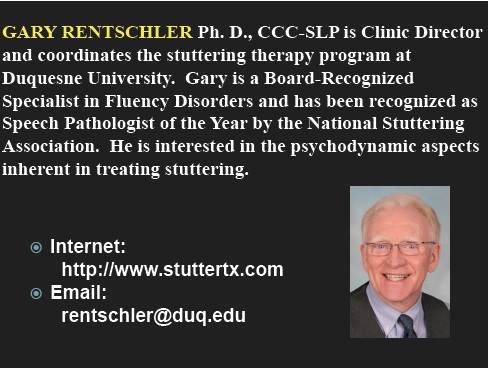
|
About the presenter: Gary Rentschler, Ph.D. CCC.SLP is Clinic Director in the Department of Speech-Language Pathology at Duquesne University in Pittsburgh, Pennsylvania, where he directs the Adult and Adolescent Stuttering Program. A board-recognized Fluency Specialist, Gary also was recognized as Speech-Language Pathologist of the Year 2002 by the National Stuttering Association. |
Fluent Passages
by Gary Rentschler
from Pennsylvania, USA
Audio file
 |
 |
 |
In my experience with my own children, I don't seem to recall them growing up and getting taller . . . at least not on a daily basis. Of course they both did, but it's difficult to remember it happening seeing them every day. I can imagine the excitement at the cabin when the annual measurement was taken and recorded on the wall, witnessing the year's development! But I suspect that they didn't realize it was happening on a day-to-day basis either. Rather it was the summer's measurement ceremony in the cabin that brought to light changes over the past year.
In a way, my experience with stuttering has paralleled this annual cabin ritual. Looking back over many years, my stuttering has really changed; but it's hard to remember it happening on a daily basis. I can recall some landmarks along the way, like when the phone rang one day and I realized that I wasn't afraid to answer it anymore. Or, instead of dreading making a speech, I now couldn't wait to give it. Or feeling frustrated when I couldn't contribute to a conversation, not because I couldn't get the words out, but because it was difficult to break in and get a turn. Then, once I did get a turn, there was the frightful realization that people were actually listening to what I was saying -- yikes! (For those readers who don't stutter, many of us who do often feel that others don't really pay attention to what we're trying to say. After we finally get our message out, everyone feels more relieved that the uncomfortable situation is over than actually listening to what we have said.) So now, my words and thoughts would be scrutinized, not my stuttering.
Reconstructing the story of my history stuttering for the presentation was like looking at those marks on the kitchen wall. So much had changed, and recalling how life used to be brought both a rush of emotions, but also a real sense of accomplishment. I almost take my speech for granted now, and I fret about it so little. There are still occasional reminders; disfluencies that sometimes take me by surprise, grounding and humbling me and marking that stuttering is still a part of me -- but is perhaps my master no longer.
Some who stutter successfully bury their past by denying what happened or, like so many other distasteful memories, hiding in the recesses of the mind. Therapy helped me confront the unpleasant things that happened related to my stuttering. As it turned out, that was the key ingredient in letting them go. Preparing this presentation took me back through much of that past, and as it turned out, therapy helped make that an easier, less painful passage than I feared. Unlike physical growth, changes in my stuttering didn't always seem to be moving forward. But any journey must anticipate a few "missteps.'" I cannot say that revisiting the past for this presentation was necessarily a "pleasure trip,'" but it was a happy reminder of the many things that have changed and that I have overcome.
Another realization was how little I now think about my own stuttering. While the memories of agonizing over each and every possible speaking situation remain etched in my mind, I am thankful for now being pretty much "worry-free'" in terms of my stuttering. What remains are the vestiges of my old stuttering-self. The realization that I will have to introduce myself at a meeting as everyone says their name before me going around the table. But the panic which once resulted has been replaced by a more rational voice inside my head, which recognizes the situation as being "high-risk,'" but now directs me toward the need to use more speech therapy techniques rather than tensing up and trying to rush my name out using too much force and effort. I am pleased to now have this "grown up'" voice in my head.
There are still times, most often when teaching, that I become so wrapped up in what I'm trying to explain that my speech breaks down and I stutter. Before, I might not have even tried to share these ideas, as the risk of stuttering was too great. But now, the words flow out, almost unabated. Stuttering, or the fear of stuttering, has lost its impact. Expressing the thought is far more important and far more rewarding. If a few stutters pop up, so be it; it's expressing the idea that's now the priority. So my attitude has taken a 180 degree turn around. That didn't happen overnight either, but it did happen with conscious effort; working toward letting go of the feelings and concerns I had about stuttering.
I think the "take away'" message is, like the wall in the cabin, we need periodically to take note of the changes that have occurred over the past year. Celebrate your accomplishments; those things that we ourselves have brought about and made happen. But if the changes are too few, use that to motivate yourself in the upcoming year. You cannot wait to be saved. Empower yourself to direct your stuttering future.
SUBMITTED: August 7, 2012
Return to original language with "show original" button at top left.